第42章 THE CONFESSIONS OF SAINT AUGUSTINE(1)
My copy of the Confessions is a dark little book, "a size uncumbersome to the nicest hand," in the format of an Elzevir, bound in black morocco, and adorned with "blind-tooled," that is ungilt, skulls and crossbones. It has lost the title-page with the date, but retains the frontispiece, engraved by Huret. Saint Augustine, in his mitre and other episcopal array, with a quill in his hand, sits under a flood of inspiring sunshine. The dumpy book has been much read, was at some time the property of Mr. John Philips, and bears one touching manuscript note, of which more hereafter. It is, I presume, a copy of the translation by Sir Toby Matthew. The author of the Preface declares, with truth, that the translator "hath consulted so closely and earnestly with the saint that he seemeth to have lighted his torch att his fire, and to speak in the best and most significant English, what and how he would have done had he understood our language."There can be no better English version of this famous book, in which Saint Augustine tells the story of his eager and passionate youth--a youth tossed about by the contending tides of Love, human and divine. Reading it to-day, with a mundane curiosity, we may half regret the space which he gives to theological metaphysics, and his brief tantalising glimpses of what most interests us now--the common life of men when the Church was becoming mistress of the world, when the old Religions were dying of allegory and moral interpretations and occult dreams. But, even so, Saint Augustine's interest in himself, in the very obscure origins of each human existence, in the psychology of infancy and youth, in school disputes, and magical pretensions; his ardent affections, his exultations, and his faults, make his memoirs immortal among the unveilings of the spirit. He has studied babies, that he may know his dark beginnings, and the seeds of grace and of evil. "Then, by degrees, I began to find where I was; and I had certain desires to declare my will to those by whom it might be executed. But I could not do it, . . . therefore would I be tossing my arms, and sending out certain cryes, . . . and when they obeyed me not . . . I would fall into a rage, and that not against such as were my subjects or servants, but against my Elders and my betters, and I would revenge myself upon them by crying." He has observed that infants "begin to laugh, first sleeping, and then shortly waking;" a curious note, but he does not ask wherefore the sense of humour, or the expression of it, comes to children first in their slumber. Of what do babies dream? And what do the nested swallows chirrup to each other in their sleep?
"Such have I understood that such infants are as I could know, and such have I been told that I was by them who brought me up, though even they may rather be accounted not to know, than to know these things." One thing he knows, "that even infancy is subject to sin." From the womb we are touched with evil. "Myselfe have seene and observed some little child, who could not speake; and yet he was all in an envious kind of wrath, looking pale with a bitter countenance upon his foster-brother." In an envious kind of wrath!
Is it not the motive of half our politics, and too much of our criticism? Such is man's inborn nature, not to be cured by laws or reforms, not to be washed out of his veins, though "blood be shed like rain, and tears like a mist." For "an infant cannot endure a companion to feed with him in a fountain of milk which is richly abounding and overflowing, although that companion be wholly destitute, and can take no other food but that." This is the Original Sin, inherited, innate, unacquired; for this are "babes span-long" to suffer, as the famous or infamous preacher declared.
"Where, or at what time, was I ever innocent?" he cries, and hears no answer from "the dark backward and abysm" of the pre-natal life.